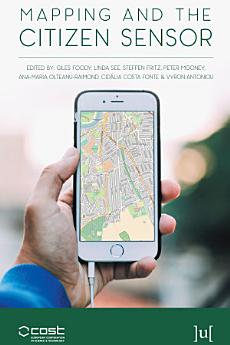Mapping and the Citizen Sensor
Giles Foody · Linda See · Steffen Fritz · Peter Mooney · Ana-Maria Olteanu-Raimond · Cidália Costa Fonte · Vyron Antoniou
Sep. 2017 · Ubiquity Press
4,2star
57 resensiesreport
E-boek
398
Bladsye
family_home
Geskik
info
reportGraderings en resensies word nie geverifieer nie. Kom meer te wete
Meer oor hierdie e-boek
Maps are a fundamental resource in a diverse array of applications ranging from everyday activities, such as route planning through the legal demarcation of space to scientific studies, such as those seeking to understand biodiversity and inform the design of nature reserves for species conservation. For a map to have value, it should provide an accurate and timely representation of the phenomenon depicted and this can be a challenge in a dynamic world. Fortunately, mapping activities have benefitted greatly from recent advances in geoinformation technologies. Satellite remote sensing, for example, now offers unparalleled data acquisition and authoritative mapping agencies have developed systems for the routine production of maps in accordance with strict standards. Until recently, much mapping activity was in the exclusive realm of authoritative agencies but technological development has also allowed the rise of the amateur mapping community. The proliferation of inexpensive and highly mobile and location aware devices together with Web 2.0 technology have fostered the emergence of the citizen as a source of data. Mapping presently benefits from vast amounts of spatial data as well as people able to provide observations of geographic phenomena, which can inform map production, revision and evaluation. The great potential of these developments is, however, often limited by concerns. The latter span issues from the nature of the citizens through the way data are collected and shared to the quality and trustworthiness of the data. This book reports on some of the key issues connected with the use of citizen sensors in mapping. It arises from a European Co-operation in Science and Technology (COST) Action, which explored issues linked to topics ranging from citizen motivation, data acquisition, data quality and the use of citizen derived data in the production of maps that rival, and sometimes surpass, maps arising from authoritative agencies.
Graderings en resensies
4,2
57 resensies
Meer oor die skrywer
School of Geography, University of Nottingham, UK
International Institute for Applied Systems Analysis (IIASA), Schlossplatz 1, 2361 Laxenburg, Austria
Department of Mathematics, University of Coimbra, 3001-501 Coimbra, Portugal / INESC Coimbra, Rua Sílvio Lima, Pólo II, 3030-290 Coimbra, Portugal
Maynooth University, Maynooth, Ireland
Paris-Est, LASTIG COGIT, IGN, ENSG, F-94160 Saint-Mande, France
Department of Mathematics, University of Coimbra, 3001-501 Coimbra, Portugal / INESC Coimbra, Rua Sílvio Lima, Pólo II, 3030-290 Coimbra, Portugal
Hellenic Army General Staff, Geographic Directorate, PAPAGOU Camp, Mesogeion 227-231, Cholargos, 15561, Greece
Gradeer hierdie e-boek
Sê vir ons wat jy dink.
Lees inligting
Slimfone en tablette
Installeer die Google Play Boeke-app vir Android en iPad/iPhone. Dit sinkroniseer outomaties met jou rekening en maak dit vir jou moontlik om aanlyn of vanlyn te lees waar jy ook al is.
Skootrekenaars en rekenaars
Jy kan jou rekenaar se webblaaier gebruik om na oudioboeke wat jy op Google Play gekoop het, te luister.
E-lesers en ander toestelle
Om op e-inktoestelle soos Kobo-e-lesers te lees, moet jy ’n lêer aflaai en dit na jou toestel toe oordra. Volg die gedetailleerde hulpsentrumaanwysings om die lêers na ondersteunde e-lesers toe oor te dra.




